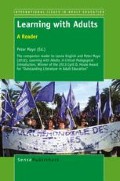Abstract
The contribution of aesthetic experience – as applied to the systematic exploration of works of art – to the learning process has been increasingly recognized by adult educators. However, the way aesthetic experience can be applied in the adult education framework, depends on the purpose we wish to serve.
Access this chapter
Tax calculation will be finalised at checkout
Purchases are for personal use only
Preview
Unable to display preview. Download preview PDF.
References
Adorno, T. (1941/1997). The sociology of music (Trans. T. Loupasakis, G. Sagriotis, F. Terzakis). Athens: Nepheli.
Adorno, T. (1970/2000). Aesthetic theory (Trans. L. Anagnostou). Athens: Alexandreia.
Arts Council (2008). Arts audiences: Insight. London, U.K.: The Colourhouse.
Berger, J. (1972). Ways of seeing. London, U.K.: Penguin Books.
Bourdieu, P., & Darbal, A. (1969/1991). The love of art: European art museums and their public. Cambridge: Polity Press.
Bourdieu, P. (1979). La distinction: Critique sociale du jugement de gout. Paris: Editions de Minuit.
Bourdieu, P. (1985). The school as a conservative force: Scholastic and cultural inequalities. In A. Fragoudaki (Ed.), Sociology of Education: Theories on Social Inequalities in School (pp. 357–391). Athens: Papazisis.
Danto, A. (1981). The transfiguration of the commonplace. Harvard University Press.
Darrough, G. P. (1992). Making choral music with older adults. Music Educators Journal, 79, 27–29.
Dewey, J. (1934/1980). Art as experience. USA: The Penguin Group.
Dirkx, J. (1997). Nurturing soul in adult learning. In P. Cranton (Ed.), Transformative learning in action: Insights from practice (pp. 79–88). New Directions for Adult and Continuing Education, no 74. San Francisco, CA: Jossey – Bass.
Freire, P. (1970). Pedagogy of the oppressed. New York, N.Y.: Herder and Herder.
Freire, P. (1971). L’̀Education: Pratique de la Liberté [Education: The Practice of Freedom]. Paris: CERF.
Freire, P. (1978). Lettres à la guinée – Bissau sur l’ alphabétisation [Letters to Guinea – Bissau on Literacy]. Paris: Maspero.
Gazetas, A. (2000). Imagining selves: The politics of representation, film narratives, and adult education. New York, N.Y.: Peter Lang Publishing.
Giannakopoulou, M., Deliyannis, D., Ziozias, A., & Chadoulitsi, V. (2011). Educational experimentations at the alternative adult school of KETHEA “EXODOS”. In A. Kokkos & Associates (Eds.), Education through Art (pp. 138–158). Athens: Metaixmio.
Gibbons, A. C. (1985). Stop babying the elderly. Music Educators Journal, 71, 48–51.
Greene, M. (2000). Releasing the imagination. San Francisco, C.A.: Jossey-Bass.
Gogou, V., & Barlos, A. (2011). Transforming perceptions through aesthetic experience at the second chance school of larisa. In A. Kokkos & Associates (Eds.), Education through Art (pp. 159–190). Athens: Metaixmio.
Horkheimer, M. (1938/1984). Art and mass culture. In T. Adorno et al, Art and Mass Culture (Trans. Z. Sarikas) (pp. 49–68). Athens: Ypsilon.
Illeris, H. (2011). Employability or empowerment? – learning in art galleries. Lifelong Learning in Europe, 2/2011, 82–95.
Kant, E. (1790/1995). Critique de la faculté de juger [Critique of judgement]. Paris: Flammarion.
Kegan, R. (2000). What «Form» Transforms? A constructive-developmental approach to transformative learning. In J. Mezirow & Associates (Eds.) Learning as Transformation: Critical Perspectives on a Theory in Progress (pp. 35–70). San Francisco, C.A.: Jossey-Bass.
Kokkos, A. (2010). Transformative learning through aesthetic experience: Towards a comprehensive method. Journal of Transformative Education, 80, 155–177. See also http://jtd.sagepub.com/content/early/2011/06/29/1541344610397663, 1–23.
Marcuse, H. (1978). The aesthetic dimension.Boston, M.A.: Beacon Press.
Myers, D.E. (1992). Teaching learners of all ages. Music Educators Journal, 79, 23–26.
Perkins, D. (1994). The intelligent eye. Los Angeles, C.A.: Harvard Graduate School of Education.
Shor, I. (1980). Critical teaching and everyday life. Montréal, Canada: Black Rose Books.
Shor, I. (1992). Empowering education. Chicago, IL: The University of Chicago Press.
Shor, I., & Freire, P. (1987). A pedagogy for liberation. New York, N.Y.: Bergin and Garvey.
Sifakakis, S. (2007). Contemporary art’s audiences. European Journal of Cultural Studies, 10, 203–223.
Thompson, J. (2002). Bread and roses: Arts, culture and lifelong learning. Leicester, UK: NIACE.
Author information
Authors and Affiliations
Editor information
Editors and Affiliations
Rights and permissions
Copyright information
© 2013 Sense Publishers
About this chapter
Cite this chapter
Kokkos, A. (2013). The Use of Aesthetic Experience in Unearthing Critical Thinking. In: Mayo, P. (eds) Learning with Adults. International Issues in Adult Education. SensePublishers, Rotterdam. https://doi.org/10.1007/978-94-6209-335-5_16
Download citation
DOI: https://doi.org/10.1007/978-94-6209-335-5_16
Publisher Name: SensePublishers, Rotterdam
Online ISBN: 978-94-6209-335-5
eBook Packages: Humanities, Social Sciences and LawEducation (R0)

